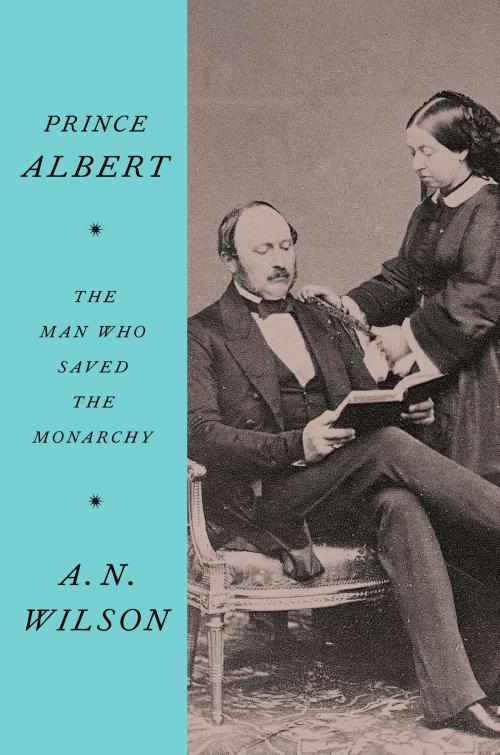Prince Albert
The Man Who Saved the Monarchy
Biography & Memoir, Royalty, Nonfiction, History, British, Historical| Author: | A.N. Wilson | ISBN: | 9780062749574 |
| Publisher: | Harper | Publication: | September 3, 2019 |
| Imprint: | Harper | Language: | English |
| Author: | A.N. Wilson |
| ISBN: | 9780062749574 |
| Publisher: | Harper |
| Publication: | September 3, 2019 |
| Imprint: | Harper |
| Language: | English |
In this companion biography to the acclaimed Victoria, A. N. Wilson offers a deeply textured and ambitious portrait of Prince Albert, published to coincide with the 200th anniversary of the royal consort’s birth.
For more than six decades, Queen Victoria ruled a great Empire at the height of its power. Beside her for more than twenty of those years was the love of her life, her trusted husband and father of their nine children, Prince Albert. But while Victoria is seen as the embodiment of her time, its values, and its paradoxes, it was Prince Albert, A. N. Wilson expertly argues, who was at the vanguard of Victorian Britain’s transformation as a vibrant and extraordinary center of political, technological, scientific, and intellectual advancement. Far more than just the product of his age, Albert was one of its influencers and architects. A composer, engineer, soldier, politician, linguist, and bibliophile, Prince Albert, more than any other royal, was truly a “genius.” It is impossible to understand nineteenth century England without knowing the story of this gifted visionary leader, Wilson contends.
Albert lived only forty-two years. Yet in that time, he fathered the royal dynasties of Germany, Russia, Spain, and Bulgaria. Through Victoria, Albert and her German advisers pioneered the idea of the modern constitutional monarchy. In this sweeping biography, Wilson demonstrates that there was hardly any aspect of British national life which Albert did not touch. When he was made Chancellor of the University of Cambridge in his late twenties, it was considered as purely an honorific role. But within months, Albert proposed an extensive reorganization of university life in Britain that would eventually be adopted, making it possible to study science, languages, and modern history at British universities—a revolution in education that has changed the world.
Drawn from the Royal archives, including Prince Albert’s voluminous correspondence, this brilliant and ambitious book offers fascinating never-before-known details about the man and his time. A superb match of biographer and subject, Prince Albert, at last, gives this important historical figure the reverence and recognition that is long overdue.
In this companion biography to the acclaimed Victoria, A. N. Wilson offers a deeply textured and ambitious portrait of Prince Albert, published to coincide with the 200th anniversary of the royal consort’s birth.
For more than six decades, Queen Victoria ruled a great Empire at the height of its power. Beside her for more than twenty of those years was the love of her life, her trusted husband and father of their nine children, Prince Albert. But while Victoria is seen as the embodiment of her time, its values, and its paradoxes, it was Prince Albert, A. N. Wilson expertly argues, who was at the vanguard of Victorian Britain’s transformation as a vibrant and extraordinary center of political, technological, scientific, and intellectual advancement. Far more than just the product of his age, Albert was one of its influencers and architects. A composer, engineer, soldier, politician, linguist, and bibliophile, Prince Albert, more than any other royal, was truly a “genius.” It is impossible to understand nineteenth century England without knowing the story of this gifted visionary leader, Wilson contends.
Albert lived only forty-two years. Yet in that time, he fathered the royal dynasties of Germany, Russia, Spain, and Bulgaria. Through Victoria, Albert and her German advisers pioneered the idea of the modern constitutional monarchy. In this sweeping biography, Wilson demonstrates that there was hardly any aspect of British national life which Albert did not touch. When he was made Chancellor of the University of Cambridge in his late twenties, it was considered as purely an honorific role. But within months, Albert proposed an extensive reorganization of university life in Britain that would eventually be adopted, making it possible to study science, languages, and modern history at British universities—a revolution in education that has changed the world.
Drawn from the Royal archives, including Prince Albert’s voluminous correspondence, this brilliant and ambitious book offers fascinating never-before-known details about the man and his time. A superb match of biographer and subject, Prince Albert, at last, gives this important historical figure the reverence and recognition that is long overdue.















